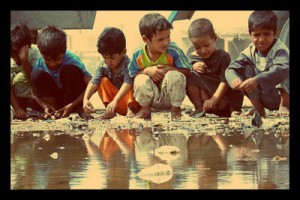The Desperate Mind of Poverty
Posted by Philippe Matthews on Feb 17, 2014 in Poverty | Comments Off on The Desperate Mind of Poverty

What’s surprising is that most people perceive “poverty” as people wandering through the streets in greasy clothes, puffing on cigarettes, carrying signs, begging for pennies, and ignoring the faint hum of hunger on their bellies.
But the stark reality is, poverty doesn’t just exist on the busiest streets of our cities downtown. It’s scary that it’s such a prevalent situation in most countries. It doesn’t just incorporate “not having money”, but it includes “minimum wage”, “malnutrition”, “famine”, “depression”, “lack of social mobility”, and a cornucopia of other sociological problems that equate to what we now know as poverty.
It’s not just a singular concept, but multiple ideas. How so?
Minimum wage is a big problem in most developing countries (a kind euphemism for third world countries) because families are distraught and suffering from lack of sufficient income. Earning less than 20% of the amount you’d need to feed your wife and children in a day is not just an issue for a single family, but for millions.
The alarming part is that economies are going from bad to worse, at least some of them. In a gist, employers are having a hard time channeling their capital and reaping profits while employees are less stable in their careers. Minimum wage in jobs is just the cream of the crop.
Malnutrition is another concept that branches out from poverty. Basically, when you don’t have enough money to sustain and feed your family, family members go hungry and essentially become malnourished. You can’t purchase good, organic, nutritious food, that’s the main problem.
It’s part of the academic program in most primary education institutions that children be made aware of proper nutrition and exercise. But regardless of being aware of what’s healthy, it’s about putting healthy food on the table. Often, the parents/providers don’t have enough on their pockets to put that kind of food on the table. It’s simple mathematics: money = good food = nutrition
Famine is the more crucial issue when discussing poverty. It is such a sensitive topic, even discussed in guilty whispers and contrived communiqués. But while unequal distribution of resources is another issue, we can’t deny the fact that a single night of food leftovers in Las Vegas would be enough to feed South Africa for a year.
In fact, famine is as big an issue as poverty, the two both simultaneous and coexistent. One cannot exist without the other; poor people are essentially hungry and hungry people are essentially poor.
Lastly, depression and lack of social mobility go hand in hand in finalizing the seeming death blow of poverty. The phrase “money can’t buy happiness” is a tad bit of a ruse. After all, you can’t be happy when you’re starving, or sick, or helpless, or homeless. Your children won’t be happy when they’re laboring to put food on the table instead of enjoying their right to go to school. More to the point, poverty spells a lack of social potential. Unfortunately, communities run on classes, it is how our societies work. Different caste systems, but all have two common factors: the rich and the poor. It’s the lower class individuals that have less social mobility, meaning if you’re poor, there’s a 42% chance you’ll stay poor.
This desperate and almost hopeless state of poverty is not just a problem in a single country, but the entire human population. It’s alarming that with so many resources in our midst and impressive technologies within our reach, we have yet to solve the BIGGEST issue we’ve faced since civil war eras erupted.
We can’t keep worrying over statistics and reading articles and not do a single thing about it. In the end, modern poverty affects us all.






